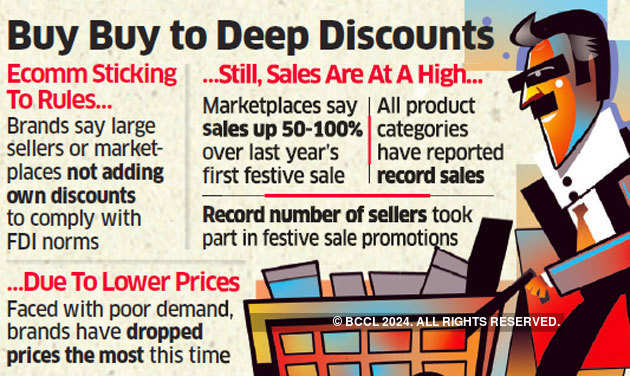 KOLKATA: India’s top two ecommerce marketplaces, Amazon and Walmart-owned Flipkart, have steered clear of deep discounting and influencing prices of products in the biggest online sale of the year that’s currently ongoing, said several companies that sell their brands on the platforms.
KOLKATA: India’s top two ecommerce marketplaces, Amazon and Walmart-owned Flipkart, have steered clear of deep discounting and influencing prices of products in the biggest online sale of the year that’s currently ongoing, said several companies that sell their brands on the platforms.This follows the tightened foreign direct investment regulations that came into effect in February. The marketplaces asked companies to offer the lowest possible price to help revive demand, said senior executives of eight top brands, including those focussed solely on ecommerce.
“They (marketplaces) had also committed that their prices will be maintained and no product will be sold below the net landing cost,” said one of the executives, asking not to be named. The landing cost is the price at which the sellers buy products from the brands.
Brands Dropped Prices
“Sellers have added extremely small profit margin on the net landing cost, which has ensured prices are low,” said one of the executives. The executives said brands were under pressure due to poor sales in the preceding months and had dropped prices on their own to clear inventory and boost demand. The marketplaces are also maintaining all records of pricing and discount credits that the brands offer for any possible audit, they said.

“The online price drop is entirely funded by us and still we are making some profit,” said Avneet Singh Marwah, CEO of online-focussed TV maker Super Plastronics, which sells Kodak and Thomson televisions. “We decided to offer such low prices due to poor demand this year. Business has peaked now.” The CEO of an online-focussed brand said this marks a switch from previous practice. He said sellers earlier would even sell below the net landing cost of a product with indirect support from marketplaces such as lower seller commissions or logistic charges. “This has changed completely,” he said.
Amazon and Flipkart kicked off festive season sales last weekend and there will be two-three more such events in the run-up to Diwali toward the end of October. Brands said they have expanded business this year by 60-100% over last year’s first festive sale, signalling a revival in demand and consumer sentiment at least on ecommerce platforms. The positive start has calmed fears that the economic slump would keep demand low.
The festive season starts with Onam in Kerala, extends through Navratri-Durga Puja and ends with Dhanteras-Diwali. It accounts for almost 35-40% of annual sales. Online-focussed BPL India is offering products at the lowest possible price, said chief operating officer Manmohan Ganesh. “Such unbelievable pricing has boosted sales, further catalysed with the consumer perception that online is the cheapest,” he said.
Puma India managing director Abhishek Ganguly said the company has almost doubled revenue from the festive season sale on ecommerce over last year. “This is despite the fact that platforms have a completely hands-off approach with regards to pricing,” he said. OnePlus said it had clocked record revenues of Rs 500 crore by the second day of the festive sales. Panasonic India CEO Manish Sharma said there was no deep discounting on the two brands it sells online — Panasonic and Sanyo — since pricing policies are aligned with the online platforms.
J Suresh, managing director at Arvind Lifestyle Brands, which sells brands such as Gap, Arrow, Tommy Hilfiger and US Polo Assn, confirmed that discounting is restricted as per mutual agreement with the marketplaces. “Yet, there has been very good response,” he said. The government tightened norms for FDI regulation for ecommerce marketplaces after brick-and-mortar retail and offline trade lobbies complained that their business was being hit by steep online discounts.
The norms barred marketplaces from influencing prices. They also capped the amount of goods that an affiliate of the marketplace could supply to any independent seller on the platform. Further, marketplaces can only hold less than 26% equity or voting rights in any seller. Spokespersons for Amazon India and Flipkart said sellers decide the prices of products sold on their platforms.
Flipkart said its role was limited to offering advice based on consumer insights. “This year especially the ecosystem as a whole has been working towards driving positive consumer sentiments,” the spokesperson said. He said there had been record participation of sellers in running promotions this year. Amazon India said the company’s investment in technology and infrastructure had allowed sellers to save costs and consistently offer attractive prices.
“Partnership with banks, sellers and ecosystem partners allow us to add further value through exchange offers, no-cost EMI (equated monthly installments), instant bank discounts among others,” the spokesperson said. The contribution of ecommerce to total retail in India is expected to rise to 7% by 2021 from 3% now, according to a study by Deloitte and the Retailers Association of India.
No comments:
Post a Comment